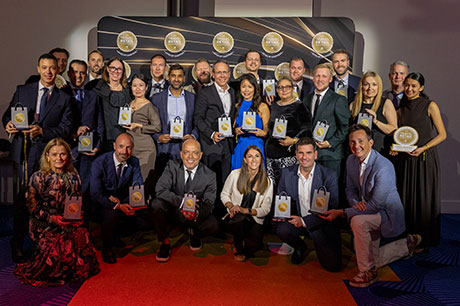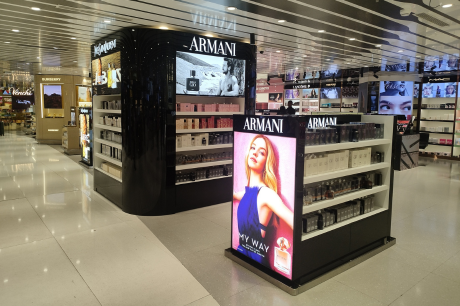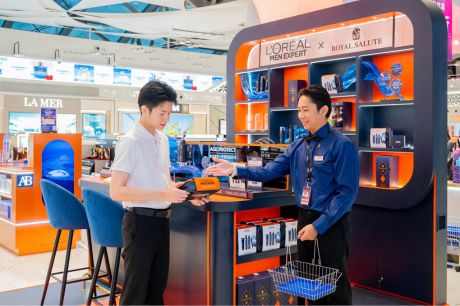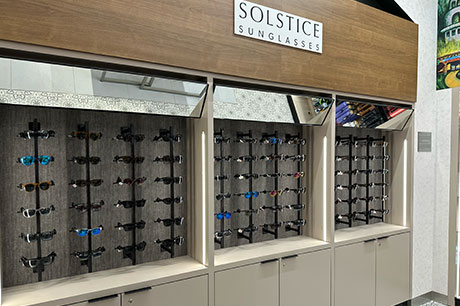Lagardère Travel Retail publishes its third annual industry-wide global report
By Benedict Evans |

Chairman and CEO Dag Rasmussen said this year marks “a pivotal chapter where innovation, sustainability, and digital transformation converge to redefine the boundaries of our industry.”
Lagardère Travel Retail has published its third annual industry-wide global report in the ‘Travel Experience Voices’ series, featuring face-to-face interviews, data insights and key topic deep-dives.
The World Airport Traffic Forecasts (WATF) 2023-2052 dataset indicates that global passenger traffic is set to double over the next 20 years, by which time China will have replaced the US as the world’s biggest aviation market.
Among other things, this means a growing challenge for the environmental footprint of the aviation industry, an emerging focus on hybrid concepts, and a world of possibilities -and challenges – when it comes to data sharing.
Hybrid concepts
Foremost amongst its findings was the growing importance of hybrid concepts, which Dag Rasmussen, Chairman & CEO, Lagardère Travel Retail (Lagardère TR) said stood at the “crossroads of innovation’.
76% of the 58 airports surveyed considered hybrid concepts to be a long-term trend, though 23% said brand/concept collaboration, and B2C concept positioning were the two primary challenges when it came to implementation.
The most important feature was efficient store layout, followed by having a diversified offer and digital/omni-channel integration. 24% also noted enhanced customer experience as the primary growth factor in the increasing popularity of hybrid concepts in airports.

As hybrid concepts become more present within the industry, many airports and brands view them as a long-term trend.
The Lagardère report utilised Muji-To-Go at Shenzhen International Airport as a case study in effective hybridisation, whereby the retailer implemented a 500sq m with retail, F&B, casual commuting, charging desks, and even meeting rooms.
In summary, the establishment of a successful hybrid concept boiled down to five key points: understanding passenger needs; experiential retail; utilisation of emerging technologies; layout optimisation; and early collaboration between all stakeholders.
A responsible offer
Brands (150 of them) and the airports surveyed agreed environmental impact was the best criteria in defining a responsible offer, which essentially is driven by an increasingly strong demand for responsible consumption among travellers.
The top three challenges faced by businesses in communicating their CSR engagement with consumers were: simplifying the message without greenwashing or green hushing (16%); difficulty in conveying complex CSR concepts (13%); and measuring the impact of CSR on overall communication efforts (12%).

The report noted: “In the ever-evolving landscape of travel retail, the surge of Corporate Social Responsibility (CSR) initiatives reflects a profound transformation towards sustainability and ethical business practices.
Greenwashing is perceived as a greater danger than green hushing, with the report noting Marseille Provence Airport’s decision to only communicate positive passenger figures when total flight numbers dip as an example.
Conversely, Lagardère pointed to its own collaboration with Singapore Changi Airport on the ‘Discover Singapore’ store as a case study in minimising environmental impact, while highlighting local and regional products.
“Embracing sustainability is not just an addition to the retailer’s agenda; it’s a cultural revolution. Retailers must transition from simply supplying demand to curating an offer that reflects a deeper understanding of quality—one that encapsulates environmental and social considerations,” noted Sophie Labbé, Associate Director at Utopies.
Data sharing
Most viewed customer data as a performance booster, with 33% agreeing that shared data strategies and business goals did so, and a further 31% noting increased passenger and consumer knowledge sharing as the second major lift offered by data sharing.

85% of both airports and brands said they were analysing and utilising customer data, but only 17% had plans to use generative AI to do so, with the vast majority (47%) remaining unsure.
Both airports and brands agreed the complexities of GDPR, compliance laws and regulations was the primary challenge they faced when developing a data-sharing model, though 56% would consider implementing a data sharing model with business partners, if it would increase customer knowledge.
“Becoming a data-driven organization entails a cultural shift where data is not just viewed as a byproduct of operations but as a strategic asset that drives growth and innovation,” commented Jerry Gupta, Head of AI Products & Insurance at Armilla.
READ MORE: Arnaud Lagardère steps down from exec roles due to indictment
READ MORE: Lagardère Travel Retail opens first Godiva Café in Asia TR
READ MORE: ‘Travel with Arden’ touches down at Paris-Orly Airport with Lagardère
Winners revealed: Global Travel Retail Awards 2025
TRBusiness is thrilled to reveal the winners of the 2025 Global Travel Retail Awards, which...
M&M’S and Crocs unveil limited-edition collection fusing fashion and fun
Mars Wrigley International Travel Retail is debuting the first-ever M&M’S collaboration...
Valentino Beauty debuts Anatomy of Dreams collection at Dubai Duty Free
L’Oréal Travel Retail and Valentino Beauty have introduced the Anatomy of Dreams fragrance...

In the Magazine
TRBusiness Magazine is free to access. Read the latest issue now.

 Trbusiness. The travel retail Trbusiness. The magazine for global retail and duty free professionals.
Trbusiness. The travel retail Trbusiness. The magazine for global retail and duty free professionals.





















